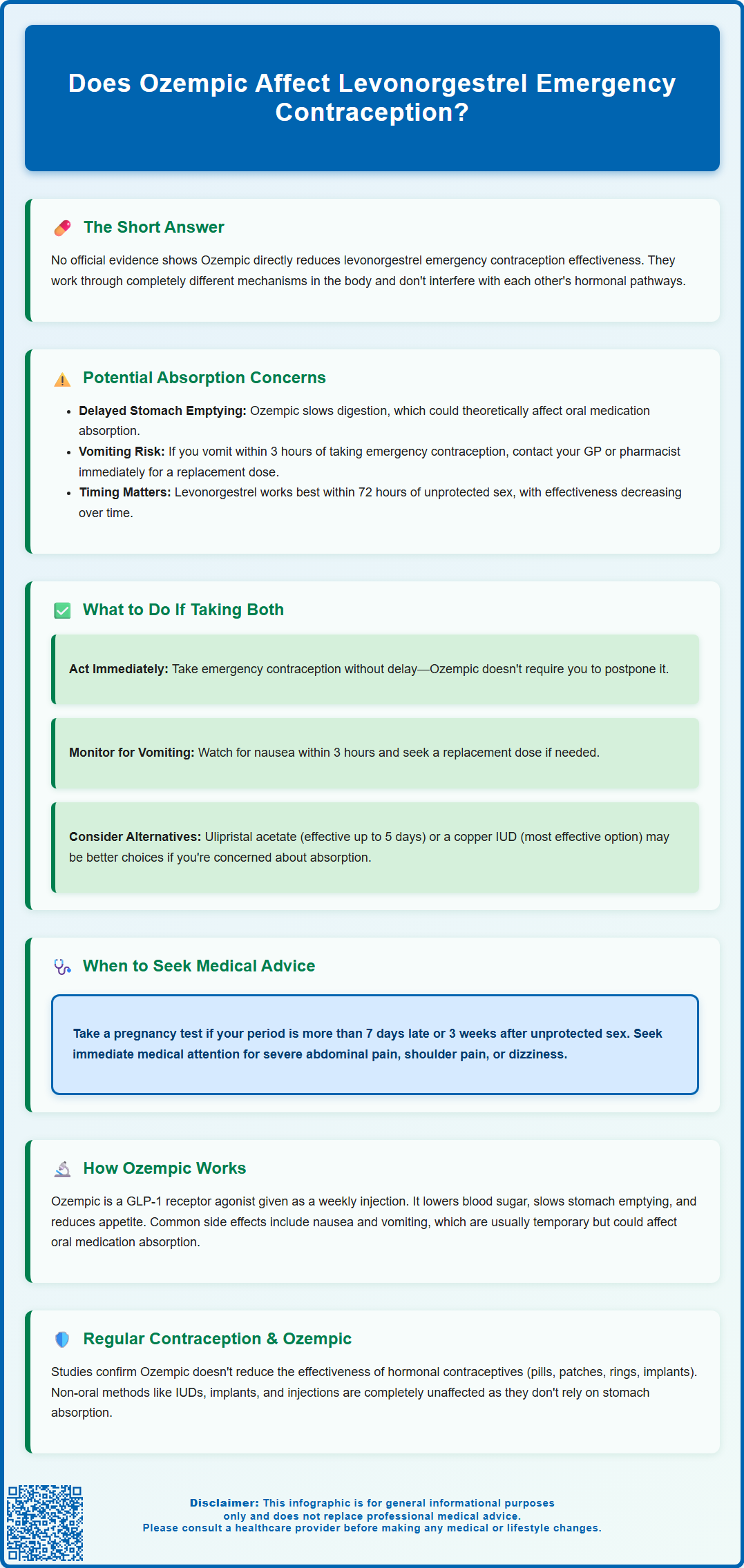Does Ozempic affect levonorgestrel emergency contraception? This is an important question for people managing type 2 diabetes whilst needing emergency contraception. Currently, no official evidence suggests that Ozempic (semaglutide) directly interferes with levonorgestrel emergency contraception (Levonelle). These medications work through entirely different mechanisms, and no pharmacological interaction has been documented in clinical studies or MHRA guidance. However, Ozempic's effect on gastric emptying may theoretically affect absorption of oral medications. Understanding this relationship helps ensure both effective diabetes management and reliable emergency contraception when needed.
Summary: Ozempic does not directly interfere with levonorgestrel emergency contraception, though delayed gastric emptying may theoretically affect oral absorption.
- Semaglutide is a GLP-1 receptor agonist that slows gastric emptying but does not affect hormonal contraceptive mechanisms
- No pharmacological interaction between Ozempic and levonorgestrel has been documented in clinical studies or MHRA guidance
- Vomiting within three hours of taking emergency contraception requires immediate contact with a healthcare professional for possible replacement dose
- The copper IUD remains the most effective emergency contraception option and is unaffected by Ozempic or gastrointestinal symptoms
- Common Ozempic side effects include nausea, vomiting, and diarrhoea, which may compromise absorption of any oral medication
Table of Contents
Does Ozempic Affect Levonorgestrel Emergency Contraception?
There is currently no official evidence to suggest that Ozempic (semaglutide) directly interferes with the effectiveness of levonorgestrel emergency contraception (known as Levonelle in the UK). These medications work through entirely different mechanisms in the body, and no pharmacological interaction has been documented in clinical studies or regulatory guidance from the MHRA or EMA.
However, one theoretical concern relates to Ozempic's effect on gastric emptying. Semaglutide slows the rate at which the stomach empties its contents into the small intestine. This delayed gastric emptying could, in theory, affect the absorption of oral medications, including emergency contraception. If you experience severe nausea, vomiting, or gastrointestinal upset whilst taking Ozempic—particularly within a few hours of taking emergency contraception—there is a possibility that the tablet may not be fully absorbed.
If you vomit within three hours of taking levonorgestrel emergency contraception, you should contact your GP, pharmacist, or sexual health clinic immediately, as you may need to take another dose. This advice applies regardless of whether you are taking Ozempic, but the risk of gastrointestinal side effects may be higher in people using GLP-1 receptor agonists.
It's worth noting that ulipristal acetate (ellaOne) is an alternative form of emergency contraception that can be used up to 120 hours (5 days) after unprotected sex. The copper intrauterine device (IUD) is the most effective form of emergency contraception and can be fitted up to 5 days after unprotected intercourse.

Potential Interactions Between Ozempic and Contraceptives
Ozempic does not interact with hormonal contraceptives in a way that reduces their contraceptive efficacy. According to the Ozempic Summary of Product Characteristics, studies have shown that semaglutide does not significantly alter the pharmacokinetics of ethinylestradiol and levonorgestrel, the hormones commonly found in combined oral contraceptive pills. This means that regular contraceptive pills, patches, rings, and implants should continue to work effectively in people taking Ozempic for diabetes.
The primary concern with Ozempic and oral medications—including oral contraceptives—centres on its effect on gastric motility and absorption. Because semaglutide delays gastric emptying, there has been some discussion in clinical circles about whether this might theoretically reduce the absorption of oral contraceptives. However, current evidence does not support this concern in practice. The MHRA and manufacturer guidance do not list hormonal contraceptives as medications requiring dose adjustment or additional precautions when used alongside Ozempic.
That said, gastrointestinal side effects are common with Ozempic, particularly during the initial weeks of treatment or after dose escalation. These may include:
-
Nausea and vomiting
-
Diarrhoea
-
Abdominal discomfort or bloating
-
Reduced appetite
If you experience severe vomiting or diarrhoea whilst taking any form of oral contraception (including emergency contraception), the absorption of the contraceptive may be compromised. In such cases, you should follow the standard missed pill guidance and use additional barrier methods (such as condoms) according to the advice in the patient information leaflet.
For non-oral contraceptive methods—such as the contraceptive implant, intrauterine device (IUD), intrauterine system (IUS), vaginal ring, or injection—there is no concern regarding absorption, as these do not rely on gastrointestinal uptake.
What to Do If You're Taking Both Medications
If you are taking Ozempic and need to use emergency contraception, there is no need to delay or avoid taking it. The most important factor in emergency contraception effectiveness is timing—the sooner it is taken after unprotected intercourse, the more effective it is.
Follow these practical steps to maximise safety and efficacy:
-
Take levonorgestrel emergency contraception as soon as possible after unprotected intercourse, ideally within 24 hours, but no later than 72 hours.
-
Consider ulipristal acetate (ellaOne) which can be used up to 120 hours (5 days) after unprotected sex and may be more effective than levonorgestrel, particularly for women with higher BMI.
-
Monitor for vomiting. If you vomit within three hours of taking the tablet, contact your pharmacist, GP, or sexual health clinic immediately, as you may need a replacement dose.
-
Consider taking emergency contraception at a time of day when your Ozempic-related nausea is typically less severe, if applicable. Some people find nausea worse in the morning or shortly after injecting semaglutide.
-
Use barrier contraception (condoms) according to the guidance provided with your emergency contraception. If you've taken ulipristal acetate, you should delay restarting hormonal contraception for 5 days and use condoms for the appropriate period thereafter.
If you have concerns about the reliability of oral emergency contraception due to ongoing nausea or vomiting, discuss alternative options with a healthcare professional. The copper intrauterine device (IUD) can be fitted up to five days after unprotected intercourse and is the most effective form of emergency contraception. It is unaffected by Ozempic or any gastrointestinal symptoms.
If your period is more than seven days late following use of emergency contraception, or if you experience unusual symptoms such as severe abdominal pain, shoulder tip pain, or dizziness, you should take a pregnancy test and consult your GP. It's advisable to take a pregnancy test 3 weeks after unprotected intercourse if you haven't had a normal period.
How Ozempic Works in Your Body
Ozempic (semaglutide) is a glucagon-like peptide-1 (GLP-1) receptor agonist licensed in the UK for the treatment of type 2 diabetes mellitus. A higher dose formulation of semaglutide (Wegovy) is licensed for weight management. Understanding how it works helps clarify why it is unlikely to interfere directly with emergency contraception.
Semaglutide mimics the action of GLP-1, a naturally occurring hormone released by the intestines in response to food intake. Its primary mechanisms of action include:
-
Enhancing insulin secretion from the pancreas in a glucose-dependent manner, which helps lower blood sugar levels (though the risk of hypoglycaemia increases when used with insulin or sulfonylureas).
-
Suppressing glucagon release, reducing the liver's production of glucose.
-
Slowing gastric emptying, which prolongs the feeling of fullness and reduces appetite.
-
Acting on appetite centres in the brain, leading to reduced calorie intake.
Ozempic is administered as a once-weekly subcutaneous injection, typically into the abdomen, thigh, or upper arm. The dose is gradually increased over several weeks to minimise gastrointestinal side effects, which are the most commonly reported adverse reactions.
Common side effects include:
-
Nausea (often transient)
-
Vomiting
-
Diarrhoea or constipation
-
Abdominal pain
-
Reduced appetite
Serious but rare adverse effects that require immediate medical attention include signs of pancreatitis (severe, persistent abdominal pain), thyroid problems (lump in the neck, hoarseness, difficulty swallowing or breathing), or severe allergic reactions.
Because Ozempic does not influence the hormonal pathways targeted by emergency contraception, there is no biological basis for a direct interaction with levonorgestrel emergency contraception. The only relevant consideration is the potential for reduced oral absorption due to delayed gastric emptying or vomiting, which is a general concern with any oral medication taken during Ozempic therapy.
If you experience any suspected side effects from Ozempic or any other medication, you can report them via the MHRA Yellow Card scheme at yellowcard.mhra.gov.uk or via the Yellow Card app.
Frequently Asked Questions
Can I take emergency contraception whilst using Ozempic?
Yes, you can take levonorgestrel emergency contraception whilst using Ozempic. There is no evidence of direct interaction between these medications, and emergency contraception should be taken as soon as possible after unprotected intercourse for maximum effectiveness.
What should I do if I vomit after taking emergency contraception on Ozempic?
If you vomit within three hours of taking levonorgestrel emergency contraception, contact your GP, pharmacist, or sexual health clinic immediately, as you may need to take another dose. This applies to anyone experiencing vomiting, but the risk may be higher with Ozempic due to gastrointestinal side effects.
Does Ozempic affect regular hormonal contraception?
No, Ozempic does not reduce the effectiveness of hormonal contraceptives. Studies show semaglutide does not significantly alter the pharmacokinetics of contraceptive hormones, and non-oral methods such as implants, IUDs, and injections are completely unaffected by gastric emptying changes.
The health-related content published on this site is based on credible scientific sources and is periodically reviewed to ensure accuracy and relevance. Although we aim to reflect the most current medical knowledge, the material is meant for general education and awareness only.
The information on this site is not a substitute for professional medical advice. For any health concerns, please speak with a qualified medical professional. By using this information, you acknowledge responsibility for any decisions made and understand we are not liable for any consequences that may result.
Heading 1
Heading 2
Heading 3
Heading 4
Heading 5
Heading 6
Lorem ipsum dolor sit amet, consectetur adipiscing elit, sed do eiusmod tempor incididunt ut labore et dolore magna aliqua. Ut enim ad minim veniam, quis nostrud exercitation ullamco laboris nisi ut aliquip ex ea commodo consequat. Duis aute irure dolor in reprehenderit in voluptate velit esse cillum dolore eu fugiat nulla pariatur.
Block quote
Ordered list
- Item 1
- Item 2
- Item 3
Unordered list
- Item A
- Item B
- Item C
Bold text
Emphasis
Superscript
Subscript












